Maniv, the VC firm based in Tel Aviv and New York City, has closed a $140 million that reflects its evolving investment ethos.
© 2024 TechCrunch. All rights reserved. For personal use only.
Venture firm Maniv has grown by nearly every measure since it launched eight years ago in Israel — from its investor base and 40-startup portfolio to its geographic focus, footprint and fund size.
But even with a freshly closed $140 million fund in its coffers and a new office in New York City, founder Michael Granoff says Maniv is still just seed stage fund at heart “that occasionally breaks its own rules.”
What that means is largely the same as when it launched in 2016: an early-stage investment strategy focused on what the firm describes as the intersection between mobility, transportation and energy.
There are, however, some notable evolutions that hint at the Maniv’s investment strategy with its third and latest fund known as Maniv III, TechCrunch has exclusively learned. Maniv, once firmly focused on Israeli startups, continues to expand its geographic focus and now has active portfolio companies in nine countries.
“So we will certainly keep keep our eyes on the local market here but we’ll go for the best deals and learn everything we can from the deal flow that comes in a very distributed way from around the world,” Granoff said.
The VC firm has also largely stopped using the once trendy umbrella term “mobility,” (often leaving it out of its original name Maniv Mobility) and has opted instead to talk about deep tech, decarbonization and digitization of the transportation sector.
“I thought the trajectory of that term (mobility) was going to continue to clarify overtime, but in fact, I think the opposite has happened for a bunch of reasons,” Granoff explained, adding that while the term mobility might not be used as often, it is still very much central to its mission.
Nate Jaret, general partner at Maniv, said the $140 million fund does reflect new goals: a more diverse group of investors as well as the inclusion of financial investors who see the decarbonization and digitization of all forms of transportation (even the air and sea) as an irreversible secular trend that generates the best financial returns.
Historically, Maniv’s investor base has been loaded with automakers. It now better reflects the critical and myriad tributaries in transportation and mobility, Jaret says. In other words, Maniv went outside traditional automotive to find strategic investors in leasing, fintech, logistics, vehicle maintenance, energy, fleet management and repair.
Its newest investors in the fund, a group that includes BNP Paribas Personal Finance and the venture arms of Shell and Enterprise Mobility, represent “the rich tapestry of industries that are directly impacted by the changes in transportation across these themes of decarbonization and digitization,” Jaret said. “It’s not just carmakers and Tier 1s that make the platforms but also aftermarket insurance, maintenance repair, infrastructure players and energy players that are trying to understand their new position.”
The Maniv III fund also includes return investors Valeo and Jaguar-Land Rover venture arm InMotion Ventures. Toyota Motor Corp.’s Woven Capital, vehicle leasing company Arval, transportation infrastructure giant Ferrovial, the industrial manufacturing firm ITT Inc., fleet payments business WEX and an unnamed European insurance company also participated in the fund.
Maniv’s fund also reflects an evolving investment strategy.
The firm, which has nearly $320 million in assets under management, previously led investments in AI edge computation chip startup Hailo in Tel Aviv; EV ridehail and charging network Revel in New York City; medium-duty EV truckmaker Harbinger Motors in California; intercity busing platform Kolors in Mexico City; two-wheeler EV startup River from India; and Spanish car subscription Bipi, which was acquired by Renault’s financing arm RCI Banque in 2021.
Maniv is now creeping into the broader climate tech world — at least where it overlaps with transportation. The firm has used the new fund to make four investments to date, including in a Chicago-based startup called Celadyne that’s working to extends the lifespan and efficiency of proton-exchange membranes to make green hydrogen production financially viable.
The fund has also invested in Israeli startup Neologic, which has developed a proprietary chip design for performance and power gains in data centers and automotive; an e-motorcycle battery-swapping startup called Vammo that’s based in Brazil; and San Francisco-based Circular, which is pushing the use of post-consumer recycled plastic in manufacturing by closing pervasive information and testing gaps.

Leave a Reply